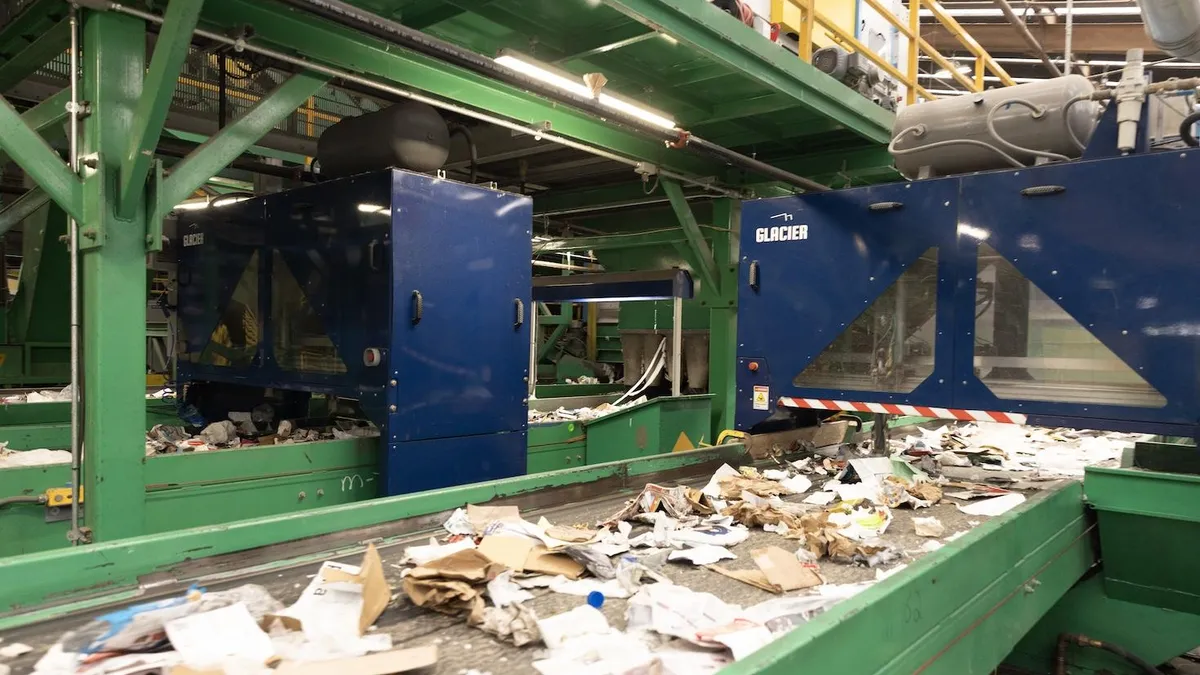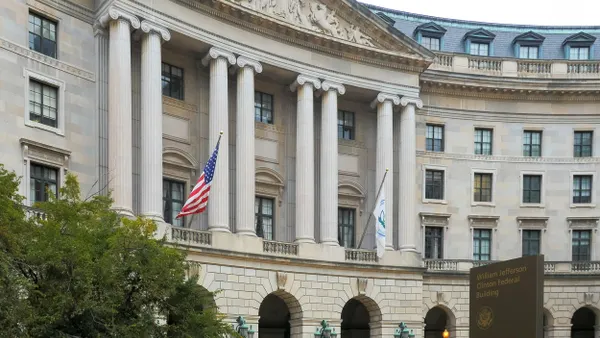Dive Brief:
- Glacier, an AI-enabled robotics sorter company, has raised $7.7 million in funding from Amazon’s Climate Pledge Fund, as well as New Enterprise Associates and other investors, the company announced in a news release.
- As part of the investment, Amazon and Glacier plan to launch a pilot program to test how artificial intelligence and robotics can be used to identify and aggregate “novel packaging materials” the company could recycle or repurpose. The partnership will also help Amazon assess its impact on reducing landfill waste and increasing the use of recycled materials in packaging.
- Glacier will dedicate a “large portion” of the funding to improving the sorting capabilities of its robots, as well as hone the real-time data it collects from the recycling stream, which it says will help meet Amazon’s pilot program goals.
Dive Insight:
Amazon’s partnership with Glacier is part of the company’s long-term evaluation of its packaging footprint and overall sustainability. Amazon has made several packaging changes in recent years, including phasing out plastic in its mailer bags, testing methods for reducing shipping packaging and planning projects to significantly reduce overall packaging in 2024.
The partnership with Glacier is ideal for Amazon because the company “is always looking at new ways to innovate on behalf of our customers, and plastic packaging is no exception,” said Nick Ellis, principal of Amazon’s Climate Pledge Fund, in a statement. “In order to build a future where new materials can be recycled at scale, we must test options to move these materials through the recycling system.”
Glacier, which launched in 2019, has spent the last few years honing what it calls “low-cost, high-performance robots” meant to differentiate itself from other AI-powered recycling robotics companies due to its price point, small footprint and recycling data services meant to give recyclers more insight.
Glacier is among the robotics companies that have recently announced plans to expand and grow through innovation partnerships. Other AI-enabled robotics companies like Greyparrot have recently announced partnerships with equipment company Bollegraaf, while EverestAI and Caglia Environmental in California entered into a profit-sharing partnership with the Can Manufacturers Institute in order to get more robotics into MRFs. Tomra recently announced it had acquired a 25% stake in PolyPerception, a waste analysis startup, in an effort to bolster its AI capabilities.
“We’re excited by the progress we’ve made in the recycling industry, but to maximize Glacier’s impact on recycling, it’s essential that we work with stakeholders across the circular economy, including brands,” said Rebecca Hu, co-founder of Glacier, in a statement. “That’s why we’re thrilled to collaborate with a sustainability leader like Amazon.”
Glacier says its AI capabilities allow it to identify over 30 different materials, “spanning from broad categories like plastic bottles and aluminum cans to specific items such as toothpaste tubes and cat food cans,” while robotics can sort difficult-to-sort items like grocery bags, it said.
The technology also generates data about what’s passing through the system. “As we see mounting legislative, economic, and social pressure to recycle better, brands are using our data to measure and improve how their packaging is being recycled, while recycling facilities are using our data to improve their operations and rescue more recyclables from landfill,” Hu said.
Glacier’s latest round of funding comes from Amazon and NEA, along with partners AlleyCorp, Overture Climate VC and VSC Ventures. Glacier last announced a major funding round in 2022, when it raised $4.5 million in seed funding led by NEA.
In addition to funding, Glacier has benefitted from participating in business accelerator programs. In October, Elemental Excelerator, a nonprofit climate technology investor, announced Glacier would join its latest cohort.
The company previously took part in the NextCycle recycling business accelerator program, which Glacier co-founder Rebecca Hu said helped boost the company’s ability to test its newest models in harsh winter environments in Michigan. NextCycle, led by the state’s Department of Environment, Great Lakes, and Energy, also gave Glacier a $367,000 grant in 2022. The grant was supported by The Recycling Partnership, the Carton Council and the Foodservice Packaging Institute.
Amazon’s investment is part of its Climate Pledge Fund and corporate venture capital fund, which it said earmarked $53 million for its Female Founder Initiative. Glacier is the second female-led company to receive investment from the Climate Pledge Fund, Amazon said.












